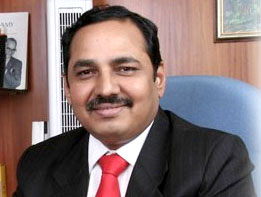Inclusive growth should boost both earnings and employment: A Balasubramanian, CEO, Birla Sun Life Asset Management Company
02 August, 2016 | Chirag Madia
ShareInvestors with horizon of more than five years should continue to look at investing in diversified equity, and mid-cap funds, says A Balasubramanian, CEO, Birla Sun Life Asset Management Company (AMC). In an exclusive interview with Chirag Madia, Balasubramanian also says that managing risks and delivering consistent performance will be key to the success of the company's asset management business. Excerpts...
 How do you see performance of equity markets and when do you see recovery in corporate earnings?
How do you see performance of equity markets and when do you see recovery in corporate earnings?
The next three-four quarters may see positive uptick on earnings, largely driven by government spending coupled with good monsoon and rural income going up. The government has also taken steps to increase the output in certain agriculture products by increasing minimum support price (MSP) which will lead to more output and more income in the hands of people. Thirdly, announcement of seventh pay commission that will lead to increase in spending and all the above factors supported by marginal reduction in the lending rates will lead to the increase in profitability. Our view is that, number of positive surprises will be far higher than negative ones. We believe that as India transitions from 'Reform to Transform', the real benefit of this will start accruing soon to our economy. With 'Brexit' happening, increasingly the focus will be on inclusive growth which should drive not only company earnings, but also generate huge employment. To add to this, interest rates staying low will also boost corporate earnings as the time progress. Lastly, in the recent past, issues around NPAs have gradually improved the credit culture of our Nation among borrowers. This which should pay off in a big way for India. So, all these factors put together should provide greater depth in equity markets.
What's your outlook on debt market and where do you see 10 year benchmark yield settling down?
We are quite bullish on interest rates and structurally it will stay lower. From the investor's point of view, debt markets will continue to give edge, compared to other instruments in the investible options. Fixed income schemes have given better returns than bank FDs with high level of transparency and this segment will continue to present bigger opportunities. We expect one rate cut by the end of this financial year. We would not be surprised if there are two rate cuts. Globally, India is the only market where yields have not gone down. I am not saying the interest rates have not rallied here in India at all, but that interest rates rally has not been commensurate with what we have seen in global markets. Speaking of yields, we feel that the entire curve could stay low.
What should investors do at this point of time?
Investors with horizon of more than five years should look at investing in diversified equity, and mid-cap Funds. In debt funds, for an investment time-frame of three-five years, they should come into accrual as well as dynamically managed funds as the money manager will play the interest rates and credit calls as applicable. Secondly, investors who don't want to take the risk should invest in medium to short-term debt funds. Finally for very conservative investors, if they are not looking for more returns they should look at liquid funds and stay for as long as they want. The idea being that many people's money stays idle in saving banks accounts. Investing them in liquid funds will fetch better returns.
But we have seen problems in credit opportunities funds in the past one year. Do you think worst is behind us in that segment?
The Mutual Fund industry is now relatively safer when it comes to credit. The industry is quite conscious of who it is lending to, and how they are structured by following strong processes. These processes however can vary from one fund house to another. What happens to various players in the industry is a reflection of how their assessment differs from that of another house. In the money management business, assessment can differ from each fund house and fund manager. Those who have strong internal risk management capability will continue to strive towards creating a portfolio structured in such a way that it delivers good experience to investors.
What kind of strategy are you adopting for equity and debt funds?
Given the revival in the Indian economy, we stay bullish on debt as well as equity. Our strategy is to build size in both asset classes, with increased focus on retail for a sustainable business model while serving the nation's savers at large. Our strategy for equity is to consistently beat the benchmark for delivery of consistent investor experience. To do this, we follow a purely bottom-up stock picking approach while examining a host of other financial parameters before owning any stock sufficiently in our portfolio. The ability to manage duration and credit in fixed income has been the cornerstone of our debt fund management. We remain focused on that, while managing debt funds using both macro variables and actively managed portfolios.
In the last few years we have seen continuous inflows into mutual funds, how do you see growth of the industry going forward?
I think assets will double in the next five years and all AMCs – irrespective of their size will grow in this business. There is space for everyone to grow. The pace and rate of growth of a house will depend on its hunger for growth. While building size, fund performance and risk management capability will remain the centre focus for fund houses like us in order to deliver consistent experience to investors. Therefore, managing risks and delivering consistent performance will be key to the success of the asset management business.






